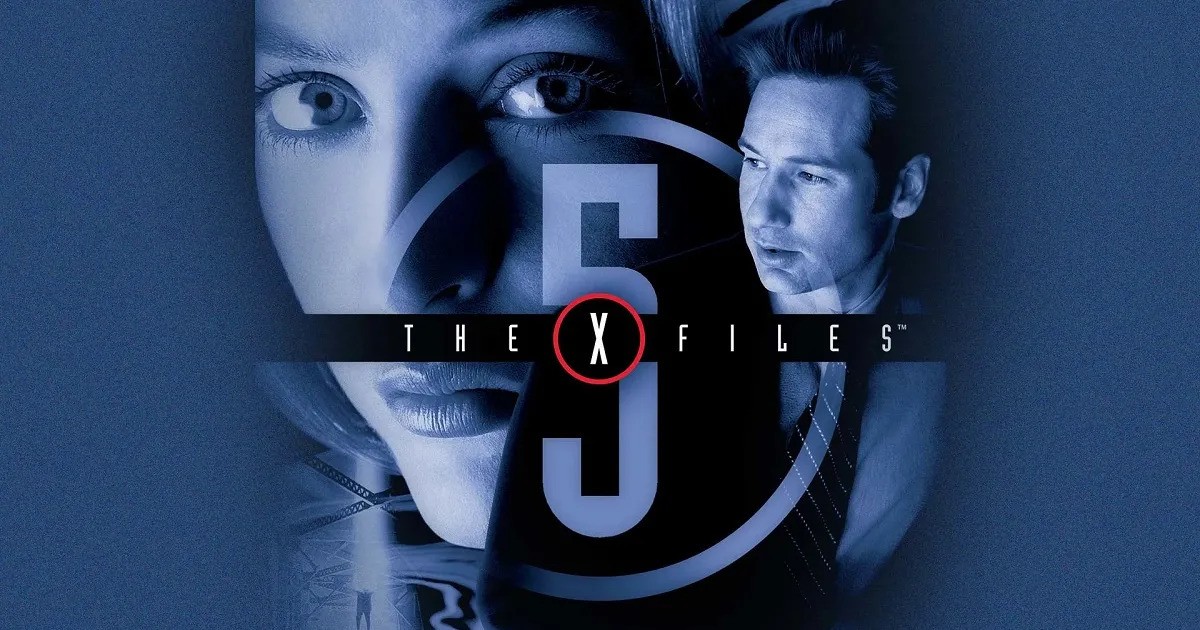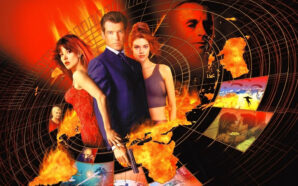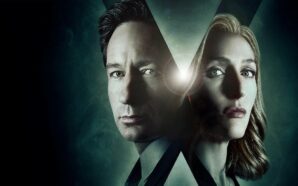The fifth season of The X-Files is the show’s first ending. The first final season of a series that would ultimately have several. When creator Chris Carter and his team of writers began work on the fifth season it was thought to be the show’s last. The story would continue as a film series, the first instalment having been shot between seasons four and five, ready to premiere after the fifth season’s finale. The films would continue the show’s convoluted mythology storyline, which forever trudges along, but this season could have been the end of the standalone case-of-the-week episodes. Thankfully, this didn’t come to pass and the show returned for four more seasons before it ended for good… until the revival.
This context is vital for understanding season 5 of The X-Files. With the potential end to standalone stories, the writers go completely nuts. Whatever ideas they have remaining get thrown at the season, no matter how bizarre. It’s a strange and eclectic season of television, varying wildly in tone and style. Not all of it works but there’s such an entertaining spirit of play and experimentation. Carter even reached out to famous novelists to write episodes in their unique voices, leading to stories by Stephen King and William Gibson. Although, despite being a shorter season of twenty episodes, this energy does begin to wear off by the end, leading to a second half less interesting than the first and in need of an extra monster or two.
While the standalone stories are at their most free and experimental, the mythology is on immovable rails, driving towards the feature film. The writers know what pieces have to be put in place so the episodes have some momentum, unlike season 4. The conspiracy is also now surprisingly frank, the basic details explained more simply than ever before. The cards are now on the table. They’re not straight and the table is messy but the pieces are finally coming together, and while I care little for it, the story is in a better place than it has been for a while.
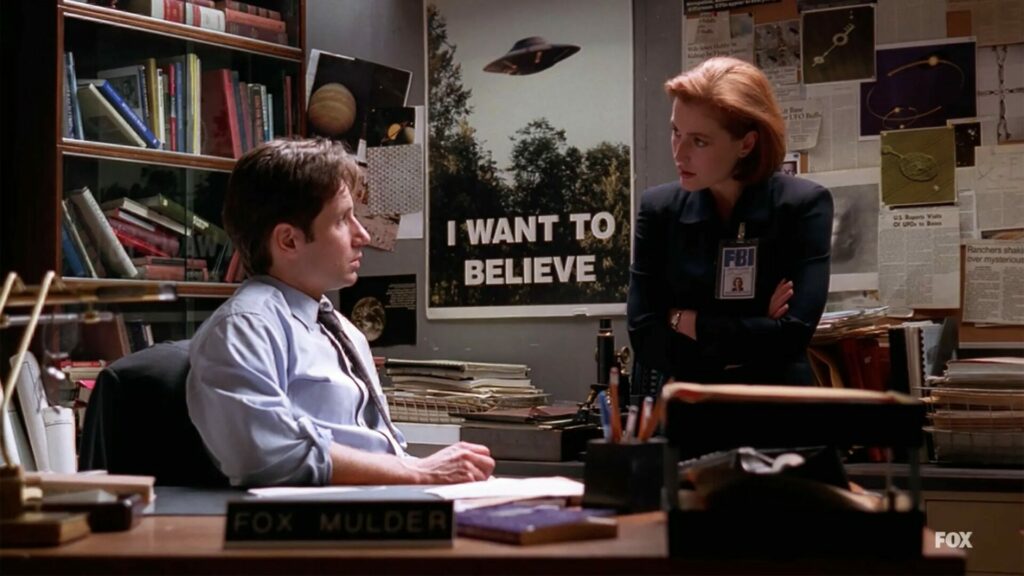
Best Character: Scully
It was hard to choose the best character of season 4 because every piece of characterisation the writers attempted worked. Season 5 is hard because everything fails. With the movie in the bag, the character stories here feel like placeholders, introducing something for Mulder and Scully to suffer with for a handful of episodes with the express notion that it needs to be wrapped up and essentially ignored once the season is over. It never feels like any character beat is truly committed to. Even the villainous Cigarette-Smoking Man suffers from this. His own organisation try to assassinate him at the start of the season, which could have been an interesting twist, only for him to be back in his regular role in the finale.
The most damning example is Mulder becoming a sceptic. This idea rears its head every so often when aliens are brought up in conversation and he nonchalantly replies with “I don’t know if I believe in that anymore.” That’s it; it’s hardly dealt with outside an episode or two. He sees crazy supernatural occurrences every episode, still believes in things like ghosts, so him choosing not to believe in aliens is fairly silly. Having said that, the lie he’s fed about it all being a government conspiracy is an interesting one, but not strong enough to counteract the last four seasons of the show.
Mulder’s extraterrestrial scepticism would work better if the audience knew the same information as him, were also made to believe the lie, but as Mulder denies everything we get see behind the curtain like never before. We hear the villainous Syndicate discuss the aliens’ plans in detail, now being privy to their meetings, so Mulder’s crisis of faith is drama that the viewer can’t really buy into. And then Mulder just sees more alien shenanigans and is straight back to being the Mulder of old by the time the season ends, ready for the movie.
Scully’s season begins equally poorly. Her cancer is immediately cured. All she needed was to put a chip in her neck, simple as that. There’s no real consequences to the storyline. But then her story soon shifts to motherhood. This exploration is better than Mulder’s crisis because the season does offer some real thematic meat on the bone, before throwing it away. Christmas Carol is a great episode dealing with Scully’s emerging maternal instincts, and alone is strong enough to secure Scully as the better character of the season. It’s a story that will be endlessly repeated as the show continues, with Chris Carter being unable to do anything with the character but have her be a mother, but it still feels fresh here. Of course, the show can only threaten to shake up the formula, it refuses to actually do it, and the storyline is abruptly ended in the worst way, which I’ll discuss later.
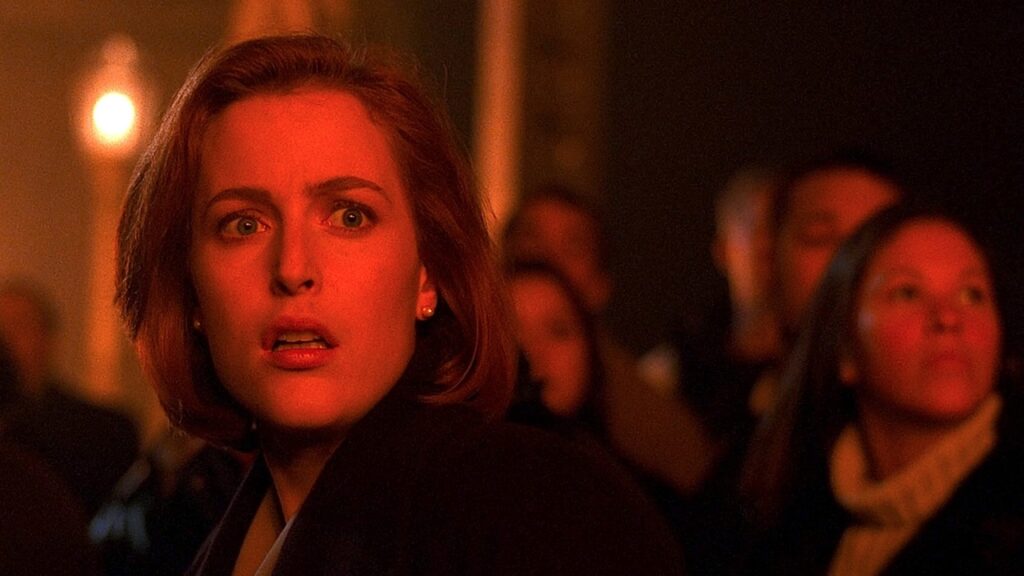
But while the season’s character arcs are lacking, both Mulder and Scully continue to be excellent in general, being so well defined and performed that they can be the centre of dark horror scripts or outright comedies without feeling out of character. They are the strong vehicles for the show but anything extra attempted with them doesn’t quite work this season. And to highlight how good they both are, reshoots for the movie meant Duchovny and Anderson weren’t available for every episode, leading to more instalments focused on just one of them, but even when separated they can carry an episode independently quite comfortably.
Biggest Disappointment: Kitsunegari (S5E8)
A rare sequel episode, Kitsunegari fails where Tooms, a previous sequel to a classic episode, succeeded. Pusher is an all-time great episode of the show and this continuation feels like an unnatural way to extend the story and, ultimately, the episode doesn’t justify its existence. It’s poorly paced and structured, with everything hinging on a reveal the writers have to keep delaying so the heroes and villains keep bumping into each other with no consequences. It turns out Modell has a twin sister with the exact same mind-control medical condition and murderous instinct, which completely ruins Modell’s character and choices because the show is saying it’s all genetic. Everything is explained in a final scene reminiscent of the bad final exposition-heavy moments of Psycho. Modell is changed into a more heroic figure, and his powers feel less defined this time, becoming more like hallucinations than just willpower. In a season of new ideas, it’s a shame to get an uninspired retread like this.
Best Cold Open: Kill Switch (S5E11)
Kill Switch is a good episode. A big budget, William Gibson cyberpunk story that feels very different for the show and is now retroactively fun to watch and just gawk at how old nineties tech is. But as entertaining as the rest of the episode is, it never tops the cold open. It follows a man on a laptop in a diner, trying to delete his rogue AI, when the AI calls different criminal gangs and law enforcement and gets them to meet at the diner, ending in a shootout that kills the man and saves the AI. It’s a really fun idea executed very well. It’s unclear what’s happening at first but then it clicks into place. Tense, violent, unexpected, and with a different grimy look and feel, it’s one of the best opening scenes of The X-Files.
Unpopular Opinion: Mark Snow’s music hurts the comedy episodes
This might be my first unpopular opinion that deserves to be called as such. I’m making people angry just by suggesting this. Mark Snow is a genius. He consistently delivers fantastic scores for episodes, particularly ones that are really creepy and tense, but the music in the comedy episodes is so grating. It’s not Snow’s fault, he’s just doing his job, it was just the sensibilities of the time. In most ways the show holds up well watching in 2024, but I struggle with the comedy music. It’s the element that feels so old to me. The performances and writing are plenty funny enough; I don’t need comedy music. There’s so much plinky plonky music to highlight that a scene is supposed to be silly or goofy. We get it! I’d prefer the show’s regular soundtrack to contrast with the humour. It makes me fear spin-off show The Lone Gunmen, which I plan to watch and cover, because the scenes I’ve seen are dominated by this type of music.
Underrated Episode: Detour (S5E4)
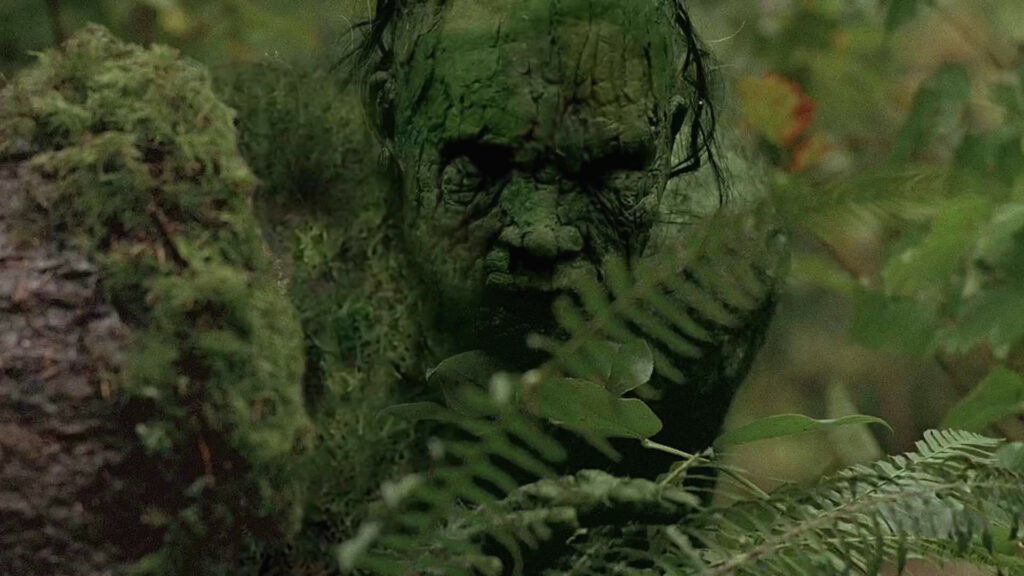
Detour is a well-received episode but in my mind it’s a classic that deserves a place on best-of lists. It’s a wonderfully traditional episode in an untraditional season. A classic out-in-the-woods story like Darkness Falls, Detour feels like one last hurrah for the Vancouver woods before the show moves to the big bland landscapes of LA next season, making the most of the dark, wet, and atmospheric surroundings. It’s a gently funny, genuinely creepy episode. On one hand similar to Quagmire, spending quality time with Mulder and Scully having rich conversations and occasionally singing, but with a scary Mothman monster. The monster effects are still effective today, with a mix of practical and computer effects that trick the mind; I spent much of the episode scanning the landscape, trying to spot the creature blending in. The episode also has an very unformulaic start with Mulder and Scully out on a training course with other agents and just happen upon the case, and I always love when a story begins like that. It’s a shame Frank Spotnitz focused so heavily on the mythology because his standalones, both this and Our Town from season 2, are great.
The Stephen King Episode: Chinga (S5E10)
Historically Stephen King has been a great novelist but a terrible screenwriter. His episode of The X-Files, Chinga, is both hurt and helped by his tendencies. It’s a fairly flimsy script, a very basic killer doll story, saved by the more King-y sensibilities. It’s scary and violent, which is a bonus, but it also has the small-town Maine location his character archetypes, like the cop, the creepy kid, and the fanatical, lecturing old woman. It’s less an episode of The X-Files and more Scully driving into a King novel, taking a holiday in another’s writer’s world. It also plays as an inverse of War of the Coprophages, with Scully on a case while Mulder provides assistance by phone, but it’s nowhere near as funny or insightful. The episode almost has something to say about women, it being a Scully episode and featuring a woman looked down on for being promiscuous, a young girl, a female doll, and a backstory connected to witches, but it never quite comes together. Chinga is more an interesting novelty than it is a great episode.
Best Guest Star: Lili Taylor as Marty Glenn in Mind’s Eye (S5E16)
Mind’s Eye was the biggest surprise of the season. I didn’t really remember it, I had it confused with other stories, but it’s a really good episode made great by the guest star. I’ve always thought Lili Taylor is underrated in pretty much everything and Mind’s Eye is no exception. She plays Marty, a blind woman who sees through a killer’s eyes. It’s a role that subverts expectations for this type of character. I expected her to be a totally innocent and vulnerable, needing the FBI agents’ help, but that’s not the case at all. For much of the episode she’s fairly unlikable. Taylor delivers a complex performance for a complex character. She wants to keep the killer out of prison and tries to cover up his crimes so she doesn’t have to see the inside of a jail cell, but also tries to stop him killing in her own way. There’s only the minimum of blind acting cliches, like not looking at people and madly waving canes around while walking. Instead, Taylor relishes playing a prideful, sardonic, funny, and irritating character I came to really enjoy by the end.
Best Monster: The Bug Creature in Folie à Deux (S5E19)
The fifth season’s best monster was very nearly its worst. Director Kim Manners half-joked it would ruin his career. An insect monster, played by a guy in a big silly suit, that was saved by some last minute visual effects. The end result is incredibly creepy: the way it flickers and vibrates and you can’t get a clear look as it judders towards you. The sound too, like the fluttering of insect wings. It’s like when you’re lying in bed and hear a bug’s wings in the dark and have to sleep completely under the covers because it might land on you in the night. Or is that just me?
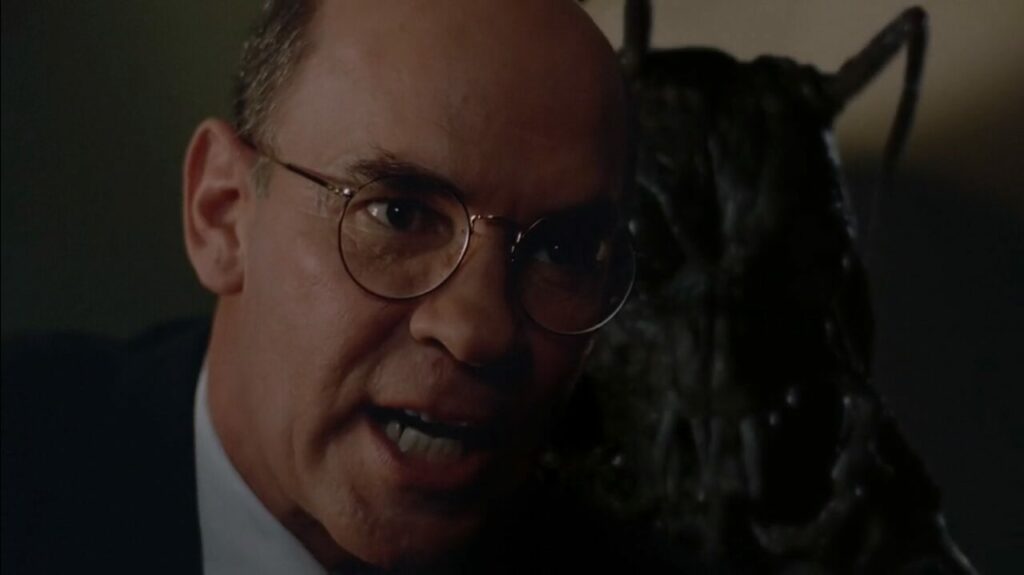
It’s also a monster aided by the lack of an explanation. It’s a big insect that can disguise itself as a human, turn people into zombies, and works as a manger in a call centre. No backstory or further information needed thankyouverymuch. The episode does play with the idea it could be mental illness driving people to see the monster, and there’s also a nice metaphor at play with the boss turning his call centre workers into literal insect drones, having them read from a script with fake smiles. The episode ends with Mulder and Scully seeing the monster together, suffering from folie a deux. The idea they share this madness, the madness of the X-files, is a nice beat on which to end what could possibly have been the final monster-of-the-week episode.
The ‘What the Hell Did I Just Watch?’ Award: The Post-Modern Prometheus (S5E5)
If you watch one season 5 episode it should be this one. The Post-Modern Prometheus is not the best episode but it is the best representation of how bold and strange the season is. A black-and-white ode to James Whale’s Frankenstein movies, it adds a pivotal question to the mix: what if the monster loved Cher? Written and directed by Chris Carter, it would be insufferably self-indulgent if it wasn’t so fun and well executed. It does echo those Frankenstein films but also reminded me of Lynch’s The Elephant Man. It’s sad story as well as a funny one.
It’s an episode that identifies what made Whale’s films so good was their weirdness, it’s a key part of the charm, like the miniature mermaid from Bride of Frankenstein. Here we get a whole town of experiments, hybrids of humans and animals, from pig boys to chicken women. Everyone involved, every department, is committed to making this episode that shouldn’t work, work. It’s not necessarily canon or real, instead a storybook fantasy, ending with a Cher concert and Mulder and Scully dancing. The Post-Modern Prometheus is a reminder of how far the premise of the show can be pushed without breaking, and is one of the most memorable episodes of the series.
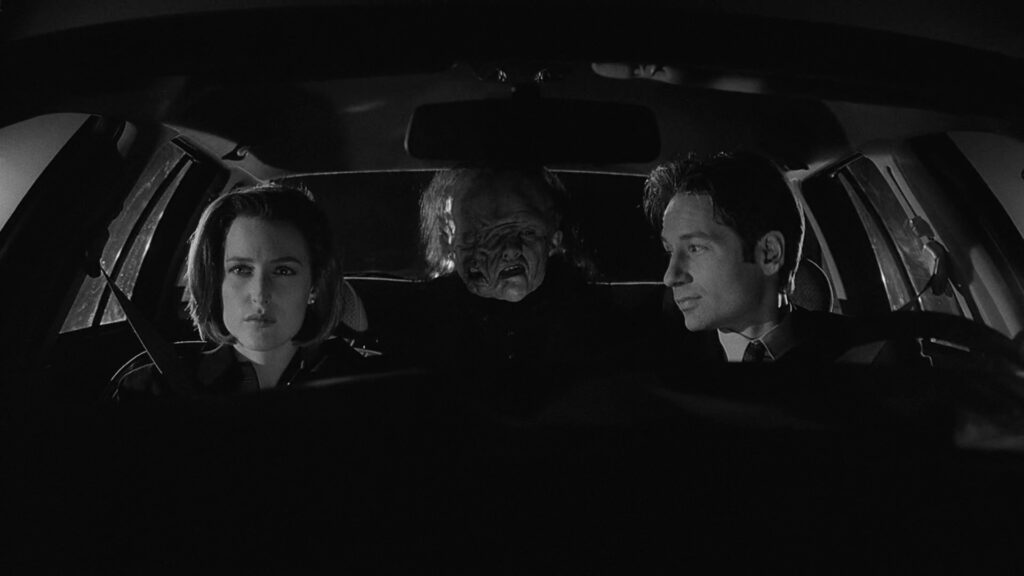
Worst Standalone Episode: Travelers (S5E15)
This is hard. For the first time there’s no clear worst standalone episode. No proper stinker. Some would say Schizogeny, but, while it’s not a good episode, it’s actually a big mess, at least it has some good ideas, so not a total failure. I’ll name Travelers as the weakest because it’s perhaps the most disappointing standalone instalment. It’s another unique episode but one that fails to capture the tone it is striving for.
Travelers is a flashback story set in the 1950s, starring FBI agent Arthur Dales, who is quite the dull protagonist. The episode is sorely missing a screen presence as strong as Duchovny or Anderson. Mulder only appears as a framing device, interviewing an older Arthur in scenes set before season 1, with Duchovny’s young acting consisting of mainly pushing his hair out of his eyes. Having the framing device also be a flashback hurts the episode because the bulk of the story features a young Bill Mulder, who is revealed to be a nefarious government agent. This should be a contemporary story that informs present Mulder’s view of his father, with Arthur’s recollections either condemning or commending Bill Mulder after his death. This would allow Mulder to deal with his dad’s legacy, question how he should think of him, rather than hear the tale while his dad’s still alive and not take action on it or even talk to his father about it.
The episode wants to be about McCarthyism, with any undesirable individual framed as a communist to hide a government conspiracy. But like with El Mundo Gira last season, the parallel of literal and metaphorical aliens is weak. It never makes much of a point. The aliens themselves also need a bit more explanation because the episode borders on nonsensical. A group of soldiers have alien spiders in their throats, and as much as the shadowy government agents are presented as the bad guys, the aliens are murdering innocent people. The setting and style of the episode could have really made it stand out but it feels cheap and haphazard, clearly not having the same budget or even effort put into it as The Post-Modern Prometheus. Even the noir-style voiceover is abandoned after one scene. Travelers never quite comes together.
Best Standalone Episode: Bad Blood (S5E12)
Bad Blood is the funniest episode of The X-Files. An out-and-out comedy, the episode is an escalation of past comedic endeavours. The writers have worked the show to the point where they can make this episode and get away with it with little question. If you show Bad Blood to someone who has only seen season 1 it would blow their mind that this is the same show. It’s an almighty swing that could have gone terribly wrong but while watching it somehow feels like a natural progression of the series and ends up being a complete triumph.
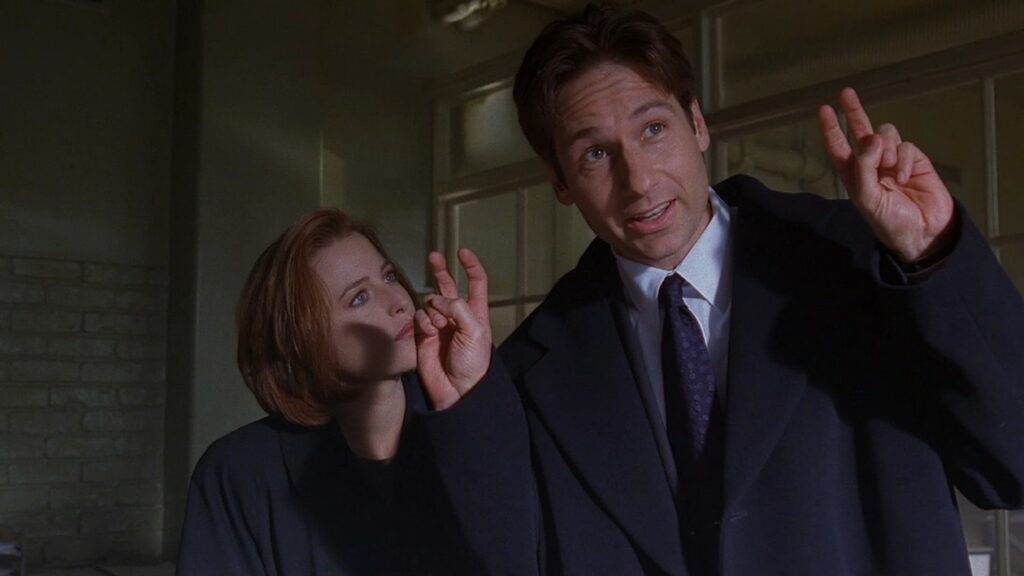
After the disastrous 3 from season 2, perhaps the only way to tackle vampires on the show is to mock the idea. They’re a monster everyone already knows the tropes of so there’s no wasting time explaining the details and writer Vince Gilligan can get right into playing with the comedic potential. But while there are vampire gags, much of the humour comes Mulder and Scully and the exploration of their relationship. Bad Blood offers a perspective shift where we first see the investigation into vampiric killings from Scully’s perspective before then flashing back to see Mulder’s point of view. Scenes repeat but it’s never boring, instead offering new insight each time. The characters act totally differently depending on who is telling the story. Anderson and Duchovny are wonderful in the episode, playing extreme versions of their characters that make sense when reminded that this is a retelling of the case rather than the case itself. Scully is patient in one version and angry in the other, while Mulder is either excitable or morose. Bad Blood is a brilliant exercise in structure and tone, and, most importantly, very funny.
Worst Mythology Episode: Emily (S5E7)
Emily is the disastrous second half of a two-part story. The first half, Christmas Carol, is a strong episode, acting as an atypical introspective personal story for Scully discovering she has a child and reckoning with motherhood in her family. Starting with the pretentious opening scene, Emily torpedoes every aspect of the story.
It suddenly becomes a Mulder episode where he advocates for Scully throughout while she does nothing. Even the way the episode is shot, showing Mulder’s reaction to every revelation before panning to Scully afterwards. While Mulder is off beating up doctors to discover Scully’s child’s origin and why she’s dying, Scully stands around, stuck in a hospital like she is in so many mythology episodes. She doesn’t even interact with her daughter and just stares at her through windows. The kid dies and Scully says “It’s okay, Mulder. It’s what’s meant to be.” What?! I don’t believe Scully has that opinion for a second. The writers put those words in her mouth just for the story to end cleanly and move on quickly as if nothing has happened.
Emily takes a personal story for Scully and drowns it in lame generic mythology elements we’ve seen dozens of times. The episode is full of evil doctors, bad religious imagery, and alien hybrids with obfuscated motives. It also forgets that we saw Scully’s pregnant belly in season 2 and tries to explain that Emily was born from a surrogate old woman in a nursing home, kept fertile with alien medicine. It’s a stupid episode I found incredibly insulting, completely ruining what begins as an important story. One of the worst episodes of the series.
Best Mythology Episode: The End (S5E20)
The End, as the title suggests, is essentially the first series finale of The X-Files, and by far the best. There’s the sense of a journey coming to an end but it’s subtle, with shots of newspaper clippings of past cases that don’t linger for too long. The case itself could be the greatest success of the X-files, with a young boy with ESP being evidence to the world of supernatural occurrences. It’s the proof Mulder has been searching for, leading to a possibility that his mission is complete. But what could be a triumphant end becomes a total defeat: the kid taken and Mulder’s office burned, his work lost instead of vindicated. It’s a bold end to the season, and exponentially more so if it was indeed the end of the series.
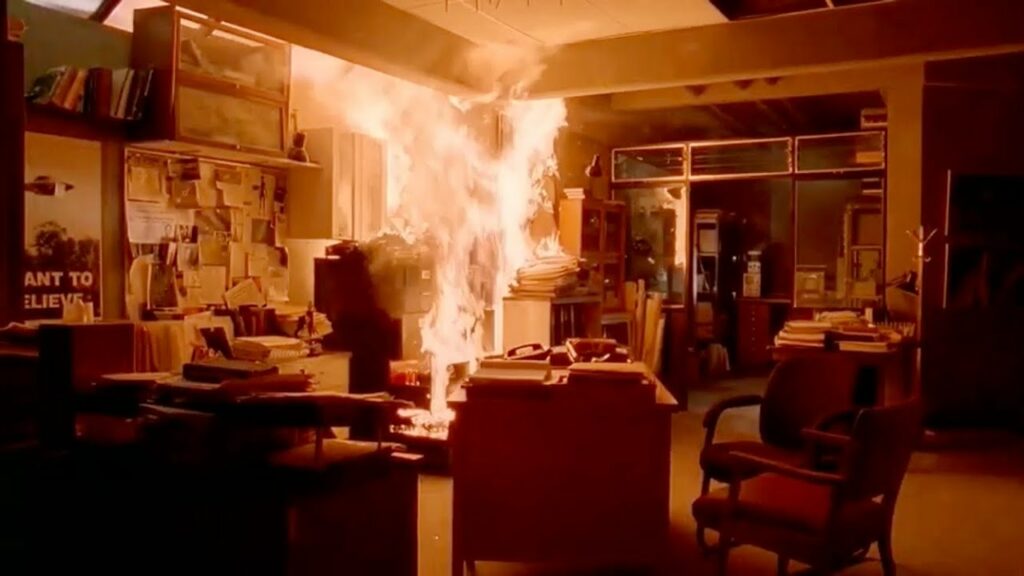
Like the best mythology episodes, The End also works as a standalone story, with the mind-reading boy, Gibson Praise, a likable character the viewer becomes quickly invested in. The grand conspiracy only works when someone we care about is in the centre of it. And the first parts of these mythology stories are always better than the second, this being the ultimate example. Despite being the end, there’s little resolution. The episode is posing questions and setting up big events with no regard for the always disappointing pay offs. They’ll come later, stretched over the movie and season 6. The End is allowed to be a big, important escalation, an ending that can enjoy the dramatic weight of an ending without actually being one and having to wrap everything up.
Five Worst Episodes:
5) All Souls (S5E17)
4) Kitsunegari (S5E8)
3) Schizogeny (S5E9)
2) Travelers (S5E15)
1) Emily (S5E7)
Five Best Episodes:
5) Mind’s Eye (S5E16)
4) Folie a Deux (S5E19)
3) The Post-Modern Prometheus (S5E5)
2) Detour (S5E4)
1) Bad Blood (S5E12)
Season 5 of The X-Files does have its low points but that’s to be expected of a season that takes big swings. I’ll gladly take a show that attempts unique ideas only for some to fall flat than one that is content to remain in comfortable mediocrity. The fifth season is big and bold and it pays off in some brilliant episodes. Despite some flaws, it’d name it my second favourite season so far, with the third season still in the top spot. Next up: The X-Files movie.




